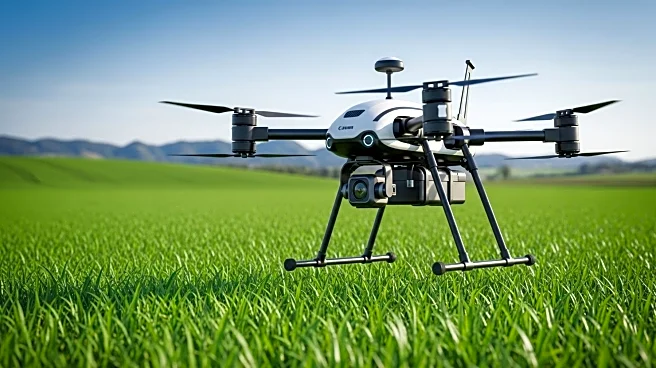What is the story about?
What's Happening?
The global market for generative AI in agriculture is projected to experience substantial growth, expanding from USD 226.2 million in 2024 to USD 2.15 billion by 2033. This growth is driven by the increasing adoption of AI models that empower farmers to make informed decisions about yields, weather impacts, and input requirements. The integration of AI with digital agriculture platforms is enhancing operational efficiency and decision-making across various agricultural cycles. Companies like Bayer AG, Microsoft, and Ernst & Young are collaborating to launch AI systems that utilize proprietary agronomic data, further advancing intelligent farming solutions. The report highlights the role of machine learning, computer vision, and cloud infrastructure in modernizing agricultural practices, with predictive algorithms and real-time monitoring playing key roles.
Why It's Important?
The expansion of generative AI in agriculture signifies a major shift towards more efficient and sustainable farming practices. By enabling precise decision-making and resource optimization, AI technologies are poised to improve crop outcomes and mitigate operational risks. This growth benefits not only large-scale agricultural operations but also smallholder farmers, particularly in emerging regions, by providing localized, multilingual advisories that enhance climate resilience. The adoption of AI-driven solutions is expected to lead to increased productivity and sustainability in the agricultural sector, potentially transforming the industry and contributing to global food security.
What's Next?
As the market for generative AI in agriculture continues to grow, further advancements in AI technologies and their integration into farming practices are anticipated. Stakeholders, including technology companies and agricultural businesses, are likely to increase investments in AI research and development to capitalize on emerging opportunities. The focus will be on developing scalable, frugal solutions tailored to diverse agricultural ecosystems. Additionally, collaborations between technology providers and agricultural firms are expected to intensify, driving innovation and the adoption of AI-driven farming solutions.
Beyond the Headlines
The rise of AI in agriculture also raises important ethical and cultural considerations. The deployment of AI technologies must be managed carefully to ensure equitable access and avoid exacerbating existing inequalities in the agricultural sector. There is a need for policies that support the responsible use of AI, protecting the interests of smallholder farmers and ensuring that technological advancements benefit all stakeholders. Furthermore, the shift towards AI-driven agriculture may lead to changes in labor dynamics, necessitating new skills and training for the agricultural workforce.
















